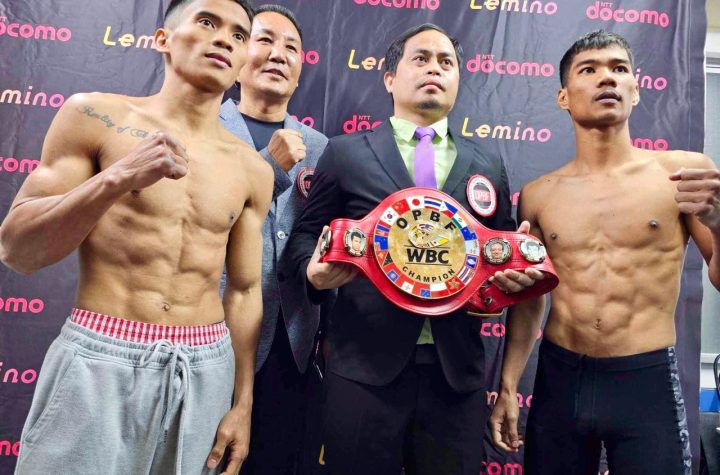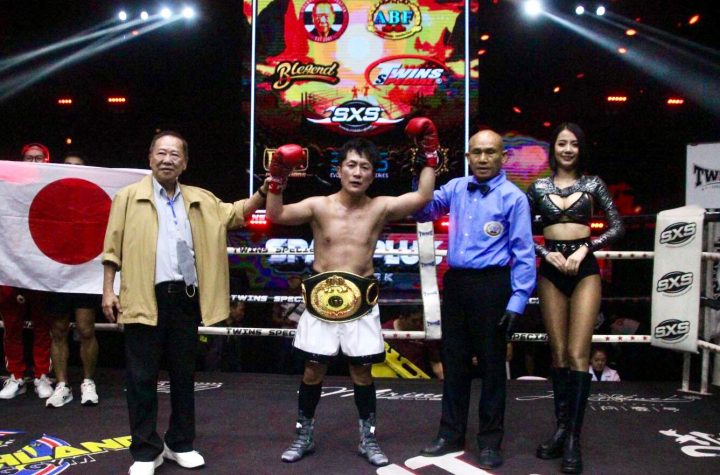
Weight cuts — the bane of a fighter’s existence! For many fighters, making weight is the toughest battle, and fighting is the easy part.
So, let’s clarify a some terminology around what it means to ‘make weight.’ There’s dieting: essentially eating less, or eating only certain foods so the body slowly gets rid of fat. And the water cut: sweating so the body temporarily becomes lighter for a short period of time — followed by re-hydration. Both these terms together are what cutting weight consists of.
In ideal circumstances a fighter will diet slowly and healthily through caloric reduction over a number of months and weeks, and then – the night before and the morning of weigh-ins – finish lowering their weight by sweating out a smaller number of pounds. Immediately after weigh-ins, the fighter drinks and eats to refuel him or herself, so they feel good on fight day.
Every fighter diets differently. Every fighter cuts water weight differently. Every fighter has a different body, so different things work. Many options are within a fighter’s control, even if other’s are not.
In the end, however, if a fighter signs the contract to fight ‘XYZ’ opponent on a set date at a set weight, they are not showing up to work properly if they miss weight. And everybody agrees: missing weight is not good.
In the old days (about 15 years ago when yours truly first started fighting!), if a fighter missed weight, they didn’t fight. Now, it’s like, ‘Oh okay, the opponent gets 20% of your purse. Go ahead and rehydrate and get ready for tomorrow!’
Wait a minute!? Now the person who missed weight is probably going to be heavier and stronger, giving them an advantage over the person who made the weight cut. Money is nice, but winning a fight is nicer. That ‘win bonus’ is nicer, too — usually double our ‘show money.’
I’ve never missed weight, but I’ve lost to the two people I’ve fought who did. A 20% fine isn’t enough.
:no_upscale()/cdn.vox-cdn.com/uploads/chorus_asset/file/13724843/1057038088.jpg.jpg)
People cut weight to get into lower classes for a variety of reasons. But, the most common two are as follows: in order to smash people, and in order to not be smashed. I dropped for the latter. Twenty one out of my forty two fights were at bantamweight — 135lbs. After I got picked up and power-bombed in Strikeforce by Sarah Kaufman (now my friend nine years later), my manager suggested dropping down to 125.
I didn’t know how to weight cut, and ended up doing it all wrong. I didn’t eat after training, so I lost a lot of muscle. I felt crappy and weak in the gym. My fight performance suffered, as a result. I went on a five-fight losing streak because my opponents were top, world class fighters, and I was only getting weaker! Finally, on season 18 of the Ultimate Fighter, Coach Bryan Caraway taught me how to water-load and salt cut, and how to walk around heavier. My performances have improved dramatically since.
Getting educated is super important. My friend — and fellow Syndicate MMA pro fighter — Serena ‘The Southpaw Outlaw’ DeJesus recalls, “Before my debut ammy fight, my first coach told me to go look up how to cut weight on the internet.” Much like Bryan taught me, I have since taught her how to do it a better way, and she’s gotten good results.
Even if a fighter has a good plan, things don’t always go accordingly. I’ve never missed weight, but I know people who have. Bodies often don’t cooperate. Pounds can be hard to burn off, even for someone who cleans up their diet. Maybe their carb-protein-fat balance is off. Maybe dairy affects them. Maybe a woman gets her menstrual cycle just before the fight and bloats five to ten pounds. Maybe the fighter was lazy and didn’t run enough. Maybe they couldn’t resist that extra donut. Maybe they woke up starving in the middle of the night and had a low-fat turkey sandwich on whole wheat bread with cheese. But, despite being healthy, it put him or her over her caloric intake limit for the day. So many things are factors.
My weight stagnated for a month once. I was so frustrated because I was depriving myself of goodies and not cheating. Then I realized I had been eating swordfish or tofu frequently for dinner, which are higher in fat and calories than my usual tuna or tilapia. At the same time, I was eating too much nuts and cheese for breakfast, so I was unable to burn off the calories to make a caloric deficit. Once I fixed those two problems, the weight came off.
Solutions for the struggle? There are so many solutions. Which are the most realistic?
WHAT FIGHTERS CAN DO:
Choose a different weight class
Usually, fighters don’t mentally give up on a weight cut — their bodies do. They want to keep fighting through the pain, but their bodies won’t sweat anymore, or their kidneys shut down. Fighters should want to feel strong and healthy in their weight class, which might mean fighting up. For female fighters who retain multiple pounds of water during their menstrual cycle, if they are so close to their body’s limit that a period will push them to miss weight, they should go up.
Worst case scenario, if I had an opponent who guessed they might miss weight because of her Flow, I’d rather they call the promotion, renegotiate the weight and ask me if I’m okay with a few extra pounds. That way I don’t have to suffer cutting so hard and get so light when they already KNOW they’re going to be heavier.
:no_upscale()/cdn.vox-cdn.com/uploads/chorus_asset/file/13724830/Calderwood.jpg)
Joanne Calderwood used to compete at strawweight but has since gone up a weight class and is currently on a winning streak. She described the emotions of missing weight in a recent interview, “It’s very stressful, disheartening and upsetting. There are so emotions that are going through your mind, feeling that you’ve already cut as much as you can and then your body doesn’t want to do any more, or that you physically or mentally can’t and that you’ve let everyone down.”
Adjust weight cutting methods
Fighters can try a different style than what they are already doing. That could mean that they diet more fat away ahead of time, and walk around leaner. It could mean start cutting out the salt from their food earlier, and drink more water. Try the hot tub instead of the sauna to sweat.
Maintain non-fight camp weight
Fighters could decide on a certain out-of-fight-camp limit for themselves, and be harsh with themselves if they approach their maximum weight. As, JoJo said, “Now I can concentrate on fight camp, whereas before I had to do cardio before and after a session to drop weight. It’s helped me so much (to stay at a lower weight).”
WHAT PROMOTIONS & COMMISSIONS CAN DO:
No contest rule
There are penalties for missing weight. The most common of them being fined 20% of a fighter’s show money. I strongly believe this is not enough of a penalty. In Japan, some promotions will force the athlete that missed to fight but not allow them the chance to win. If the athlete that missed weight finishes the fight, the bout is ruled a no-contest.
Point deductions
However, I think that’s a little too extreme. One Japanese promotion had the missed fighter start the first round with a yellow card, or a point deduction. I fully support this idea. I strongly believe there should be some penalty that affects the results of the fight. Money does not affect the fight. A point will make a difference in a decision.
Multiple weigh-ins
I’ve fought for a promotion that had a rebound rule. I weighed in again on fight day and I was not allowed to have rebounded above a certain number of pounds — the amount being based on my weight-class. I think this is reasonable. I’ll cut ten pounds of water, so I’ll step into the cage as a 125 lb flyweight at 135 or 136. If I’m going to face someone stepping into the cage who rebounded to 145, they definitely have a size and strength advantage.
Still, I wouldn’t support the main weigh-in being the same day as the fight. Fighters would likely try to cut a lot, and possibly end up at higher risk of brain damage from fighting dehydrated. Kidney functions can shut down and put the fighter’s life in danger. To that end, early morning weigh-ins are way better than night-time ones, because the fighters have more time to hydrate, and can eat more between weighing in and fighting.
Eventually, there are so many factors with weight-cutting and weigh-ins that there is no single easy solution. With more information readily available nowadays, hopefully athletes will make better decisions. And ultimately, it’s the fighter’s responsibility to diet and choose their weight class carefully, based on what’s right for their body. As Ronda Rousey once said, “Our body is our business.” GRID VIEW
/cdn.vox-cdn.com/uploads/chorus_asset/file/13726516/1524430_710729652353078_3794442093572294007_o.jpg)
1 of 9Roxanne Modafferi faces off against Tara LaRosa at the Invicta FC 8 weigh-ins. Esther Lin|Invicta FC





More News
Fajardo, Simri Make Weight
Charr, Pulev, Lambert in Bulgaria
UNDISPUTED: Yokasta vs Seniesa